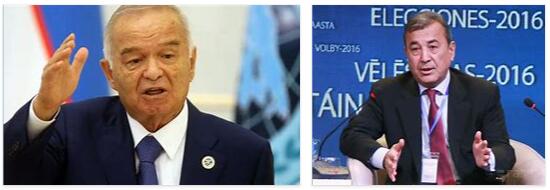Uzbekistan Politics and Law

Uzbekistan, Uzbekia, officially Uzbek Özbekiston Respublikasy, German Republic of Uzbekistan, state in the center of Central Asia with (2018) 33 million residents; The capital is Tashkent.
Country Overview
Uzbekistan is a presidential republic in Central Asia with the capital Tashkent. Four fifths of the country are desert-like lowlands and plains. In the east, high mountains rise up to 4643 m above sea level. The foothills, in which the fertile Fergana basin is turned on, and the lands along the river Amudarja be taken by quilting. The dry continental climate has long hot summers and short cold winters. Uzbekistan is the most populous country among the Central Asian republics. The Uzbeksmake up over 80% of the total population and are committed to Sunni Islam. Larger ethnic minorities are Tajiks, Kazakhs, Russians and Karakalpaks. The Turkic language Uzbek is the official language. The importance of Russian as a lingua franca is declining sharply. In the 7th century, Arabs invaded what is now Uzbekistan and spread Islam. Mongols conquered the area in the 13th century. In 1369-1405, Samarkand was the capital of a powerful empire under the Mongol ruler Timur . In the 15th century, the Turkic Uzbeks immigrated from Western Siberia and mixed with the local population. Uzbekistan fell under Russian rule in the 19th century and became a Soviet republic within the Soviet Union in 1924. In 1991 Uzbekistan declared its independence and became a member of the CIS. The first President I. Karimow (1990-2016) established an authoritarian system of rule. The extraction and processing of raw materials such as natural gas, gold, uranium and copper, along with construction and industry, have ensured economic growth since the 2000s. The monoculture cultivation of cotton has caused great environmental damage. As a member of the OSCE and NATO’s Partnership for Peace program , Uzbekistan is involved in the fight against Islamist terror.
Parties
The Political Parties Act of 1996 laid the foundation for the emergence of a multi-party system, but forbids foundations on an ethnic or religious basis. The parties represented in parliament all support the ruling regime. These include the Liberal Democratic Party of Uzbekistan (founded in 2003), the People’s Democratic Party of Uzbekistan (founded in 1991; successor organization to the CP), the Democratic Party of Milliy Tiklanish (founded in 1995), the Social Democratic Party of Uzbekistan Adolat (German for “justice”; founded in 1995) and the Ecological movement of Uzbekistan (founded in 2008), for which 15 seats are reserved in parliament. According to equzhou, opposition parties such as B. the party of the people’s movement Birlik (Eng. “Unity”; created in 1988) the official registration as a party is denied.
Unions
The Council of the Trade Union Confederation (Uyushmalari Federatsiyasi) is considered to be closely interwoven with the state apparatus. The federal government was founded in 1925 and comprises 14 individual trade unions.
Military
The total strength of the conscription army (twelve months’ service) is around 48,000 men, with around 20,000 paramilitary members of the internal security troops and 1,000 national guards at their disposal. The army (24,000 soldiers), which is divided into four military districts, has ten motorized infantry brigades, one tank, one mountain and one airborne brigade and three artillery brigades. the air force has 7,500 men. Uzbekistan has been cooperating with NATO within the framework of the Partnership for Peace program since 1994.
Education
There is an eleven-year general schooling requirement from the age of 7. The school system is divided into a four-year primary and a five-year lower secondary. This is followed by a compulsory further three-year secondary education at a vocational college or a lyceum, which leads to a general higher education entrance qualification. In the higher education sector there are 68 colleges and universities, including the Uzbek National University in Tashkent (founded in 1920) and the state universities in Samarkand and Nukus.
Media
The media, including the Internet, are subject to strict state censorship.
Press: The most important daily newspapers are the government organs “Chalk Sozi” (“Word of the People”, founded in 1991; Uzbek, weekly edition in Russian) and “Pravda Wostoka” (“Truth of the East”, founded 1924; Russian). “Osbekistan ozovi” (“Voice of Uzbekistan”) is the organ of the state party. “Ma’rifat” (“Enlightenment”, founded in 1931; Uzbek) and “Toshkent Xakikati / Tashkentskaya Pravda” (founded 1954; Uzbek, Russian) appear twice a week. »Nowy Wek« (»New Age«, founded in 1992; Russian) and the youth newspaper »Turkiston« / »Molodjosch Uzbekistana« are weekly newspapers.
News agencies are Uzbekistan National News Agency (UzA; state), »Jahon« (»World«; agency of the Ministry of Foreign Affairs), Press-UZ.info (private; founded in 2005).
Broadcasting: The state broadcasting company MRTK operates four radio and twelve television stations, including a youth station (»TV Yoshlar«) and a sports channel. “Kamalak-TV” broadcasts foreign satellite programs. »TV Markaz« is a television station with music and entertainment programs. There are also 20 regional TV channels and around 15 radio stations.